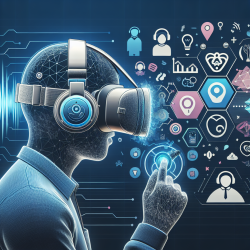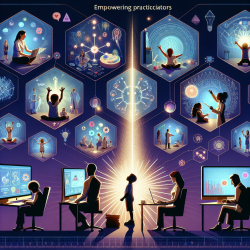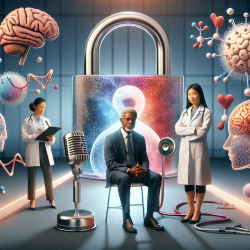In the ever-evolving field of special education, practitioners continually seek innovative methods to enhance therapeutic outcomes for students with various disabilities. One such promising approach is the use of virtual reality (VR) for delivering social support to individuals with aphasia. A recent study titled A randomised trial of social support group intervention for people with aphasia: A Novel application of virtual reality sheds light on the feasibility and potential benefits of this approach.
Study Overview
The study aimed to determine whether it is feasible to deliver group social support to people with aphasia via a multi-user, virtual reality platform called EVA Park. Aphasia, a condition often caused by stroke, leads to significant language impairments, impacting social participation and quality of life. Traditional group therapy has shown benefits in improving communication and social connectedness, but logistical barriers often limit its accessibility. This study explored whether VR could overcome these barriers.
Key Findings
- Feasibility: The study successfully recruited 34 participants, with 85.3% completing the intervention. This indicates a high level of acceptance and feasibility for using VR in aphasia therapy.
- Compliance: Participants attended an average of 81.6% of the scheduled sessions, demonstrating good compliance with the intervention.
- Fidelity: The intervention maintained high fidelity to the planned protocol, ensuring that the core components of the therapy were delivered as intended.
- Outcomes: While no significant changes were observed in most outcome measures, the Western Aphasia Battery-Revised showed a significant improvement, suggesting potential benefits for language skills.
- Cost: The average cost per participant was approximately £1,364 ($2,000 USD), highlighting the economic feasibility of this approach.
Implications for Practitioners
For practitioners in the field of special education and speech-language pathology, these findings offer valuable insights into the potential of VR as a therapeutic tool. Here are some actionable steps:
- Explore VR Platforms: Investigate VR platforms like EVA Park that are designed for therapeutic purposes. Assess their usability and accessibility for your clients.
- Training and Support: Ensure that therapists and support staff receive adequate training to effectively deliver VR-based interventions.
- Client Selection: Carefully select clients who are likely to benefit from VR interventions, considering factors such as their level of aphasia, technological competence, and willingness to engage in virtual environments.
- Further Research: Encourage further research and trials to explore the long-term benefits and potential improvements in VR-based therapy for aphasia.
Conclusion
The use of VR in delivering social support for people with aphasia shows promising feasibility and potential benefits. While more research is needed to establish its efficacy fully, practitioners can begin to explore this innovative approach to enhance their therapeutic offerings.
To read the original research paper, please follow this link: A randomised trial of social support group intervention for people with aphasia: A Novel application of virtual reality.










